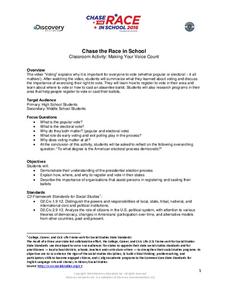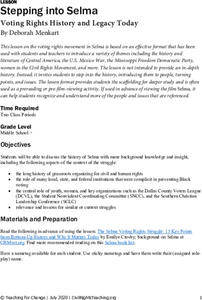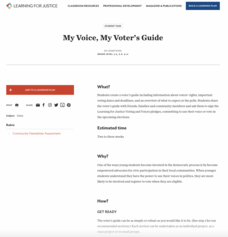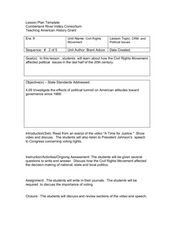Library of Congress
Suffragists and Their Tactics
Students research the fight for voting rights. In this women's history lesson, students analyze primary sources to develop an understanding of the strategies employed by the suffragists to gain voting rights.
Curated OER
Nonviolence as a Tool for Change Lesson 1
Students examine voting rights in the South during the 1950s and 1960s. In this civil rights lesson, students examine legal rights and the opportunity to cast votes. Students research primary documents regarding the topic and share their...
Curated OER
"Father" of Our Country vs. "Father" of the Bill of Rights
Learners examine the relevance of the Bill of Rights. In this Bill of Rights instructional activity, students study the parts of the Constitution and the ten amendments. They investigate the rights and responsibilities that accompany...
Curated OER
Voting Then and Now
Students consider the impact of the Voting Rights Act as they examine voting practices today. For this voting lesson, students research details regarding the Voting Rights Act and then read a handout regarding voting data from the early...
PBS
Gloria Steinem’s Ancestry and Women’s Rights Movements: Lesson Plan | Finding Your Roots
Introduce class members to Presidential Medal of Freedom winner, activist, writer, and lecturer Gloria Steinem with a PBS resource that not only investigates Steinem's ancestry but also encourages learners to trace their own.
Curated OER
Redistricting: Drawing the Lines
Difficult redistricting concepts are covered in a context that will make it understandable to your government scholars. They begin with a KWL on the term redistricting and then watch a video to answer some questions. They analyze...
Discovery Education
Making Your Voice Count
As learners watch a video on voting, they take notes on a worksheet that lists various voting topics, including electoral and popular votes, early voting, and exit polling. Then, young people research the Internet for their state's...
Center for History Education
Women's Rights in the American Century
Today, many young people find it hard to understand why it took over 150 years for women in the United States to get the right to vote—why there was even a need for the suffrage movement. As they read a series of primary source...
Curated OER
ONE VOTE
In order to understand the political process and the importance of voting, pupils will construct a class time line. They will group up and research a specific era, creating a time line of political events where one vote made a...
US House of Representatives
Legislative Trends and Power Sharing Among Hispanic Americans in Congress, 1977–2012
Bilingual education, voting rights, and Congressional redistricting come up often in the news. Explore these topics from another view—the perspectives of Hispanic members of Congress. Activities include an article with comprehension and...
Teaching for Change
Stepping into Selma
The 1964 Selma to Montgomery, Alabama voting rights marches are the focus of a lesson plan designed to introduce learners to people who took part in the Civil Rights Movement. Class members set into the role of one of the participants,...
Curated OER
Fight For Your Right - Leading A Revolution of Change
Students examine civil rights. In this civil rights lesson, students research human rights issues of United States history. Students then discuss their research findings and write Bill of Rights statements for the topics they researched.
Teaching Tolerance
My Voice, My Voter's Guide
Class members may be too young to vote, but that doesn't mean their voices are silent! After researching key information, such as policies for registering to what to expect at the polls, young scholars create and present election guides...
Carolina K-12
Preventing Voter Fraud or Encouraging Voter Suppression?
The issues of voter fraud and voter suppression are relevant in every election, local as well as national. Soon-to-be voters learn about a recent bill proposed in North Carolina, the Voter Information and Verification Act, and decide for...
Curated OER
Picturing Freedom: Selma-to-Montgomery March, 1965
Students analyze primary sources to investigate the Civil Rights Movement. In this Civil Rights lesson, students explore the passage of Voting Rights Act of 1965 and how photojournalism impacted the passage of the legislation. Students...
Curated OER
Bang to Rights
Students take a closer look at the rights of British prisoners. In this current events lesson plan, students research the listed Web sites that include information about the British justice system and voting practices. Students discuss...
Curated OER
To Vote or Not to Vote? that is the Question!
Students examine voting rights provided by the United States Constitution. In this voting lesson plan, students focus on 3 amendments that extended voting rights to all citizens. Students discuss the importance of expressing opinions...
Curated OER
The March from Selma to Montgomery
Students examine voter discrimination. In this Civil Rights lesson, students watch segments of "Eyes on the Prize" and discuss the organization of the march from Selma to Montgomery. Students conduct interviews to learn personal stories...
Curated OER
Religion and the Civil Rights Movement
Students investigate the role of religion in the Civil Rights Movement. In this religion and ethics lesson, students explore the separation of church and state as they examine how religious faith has inspired social change in the United...
Curated OER
Jacksonian America and the Indian Removal Act of 1830
Students utilize primary sources to explore the national climate concerning Native American Indians during the Andrew Jackson administration. They are presented with opinions for and against the Indian Removial Act of 1830 as they...
Curated OER
Universal Suffrage
Young scholars explore concept of suffrage. In this voting rights lesson, students participate in a classroom activity that excludes girls from voting. Young scholars discuss gender issues and write essays regarding the restriction of...
Curated OER
CRM and Political Issues
Ninth graders explore the impact of the American Civil Rights Movement. In this 20th century American history lesson, 9th graders watch "A Time for Justice," and listen to a voting rights speech delivered by President Johnson. Students...
Curated OER
The Journey to Civil Rights
Young scholars explore several significant figures and events of the Civil Rights Movement and sequence the key events to create a timeline. The lesson utilizes the story, "The Story of Ruby Bridges," the work of Robert Coles to...
Tennessee State Museum
Understanding Women’s Suffrage: Tennessee’s Perfect 36
Tennessee was the pivotal state in ratifying women's suffrage in 1920, with its vote coming down to one man: Harry Burn, a 24-year old state representative who changed his nay to an aye on the advice of his mother. Learn more about...
Other popular searches
- Voting Rights Movement
- Voting Rights Act
- 1965 Voting Rights
- Minority Rights and Voting
- America and Voting Rights
- America Voting Rights
- Voting Rights Act 1965
- Voting Rights History
- Voting Rights Act of 1965
- Expanding Voting Rights
- Voting Rights of Women
- History of Voting Rights

























